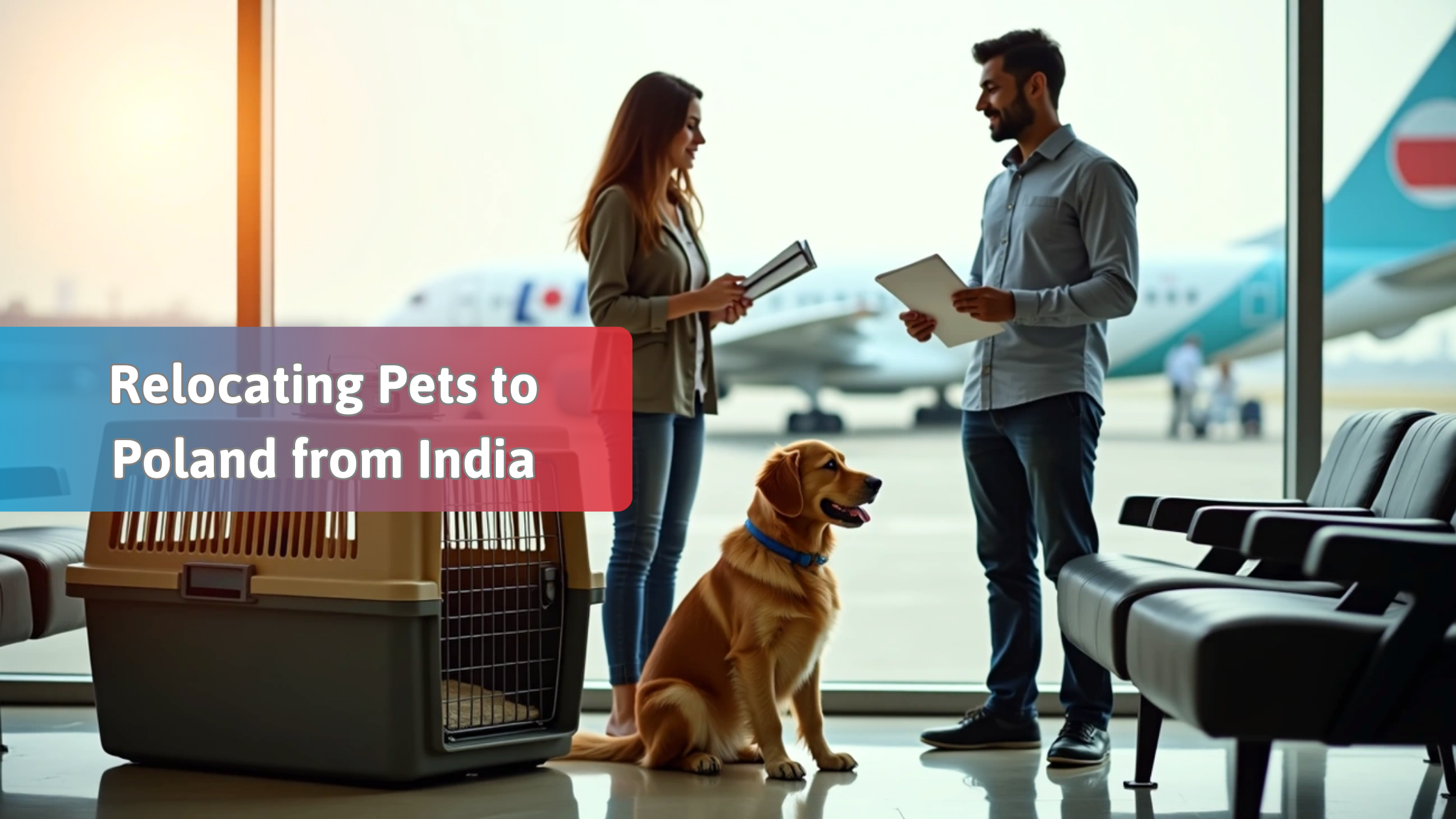Relocating Pets to Poland from India: What Nobody Tells You About Pet Travel
Relocating pets to Poland from India requires navigating a maze of strict regulations that many pet owners overlook. Did you know Poland bans eleven specific dog breeds from entering the country, including popular breeds like Rottweilers and American Bulldogs? This is just one of the many crucial details you need to know before planning your pet’s journey.
When transporting pets to Poland, preparation must begin months in advance. Importantly, all pets need microchipping before receiving their rabies vaccination, and must undergo a rabies titer test 30 days after vaccination. Furthermore, your furry companion must be at least 7 months old to enter Poland, with all vaccinations completed and properly documented. Additionally, relocating pets internationally requires an IATA-specified crate if traveling by air.
We understand how overwhelming Poland’s pet policy can seem at first glance. That’s why we’ve created this comprehensive guide to help you navigate the complex requirements, necessary documentation, and logistical considerations. Let’s ensure your pet’s journey to one of Central Europe’s most biodiverse countries is smooth and stress-free.
Understanding Poland’s Pet Import Rules
Poland has established itself as one of the most pet-welcoming countries in Europe, yet newcomers are often surprised by its rigorous pet import regulations. These seemingly contradictory aspects of Poland’s approach to pets actually work together to create a safe environment for both resident and visiting animals.
Why Poland is pet-friendly but strict
Poland values animal welfare highly, which explains the dual nature of its pet policies. Throughout Polish cities, you’ll find numerous pet-friendly restaurants, accommodations and even shopping centers. However, this same concern for animal welfare drives the country’s strict import regulations.
The Polish government maintains these stringent rules primarily to:
- Prevent the spread of zoonotic diseases
- Protect native wildlife populations
- Ensure incoming pets are healthy and properly cared for
- Maintain compliance with broader European Union animal health standards
Though seemingly burdensome, these regulations actually benefit both visitors and residents by maintaining Poland’s status as a country with minimal pet disease transmission.
Overview of Poland pet policy for international travelers
For those relocating pets to Poland from India, understanding the policy framework is essential. Poland adheres to the European Union’s pet travel scheme while adding several country-specific requirements.
The Polish pet policy framework consists of:
- Identification protocols – All pets must be permanently identified before entry
- Health verification system – Multiple vaccination requirements and health certificates
- Quarantine provisions – Though rarely implemented if documentation is complete
- Breed-specific legislation – Certain breeds face entry restrictions or bans
- Entry point protocols – Only specific airports and border crossings accept animal entry
Unlike some countries with simplified pet entry processes, Poland requires advance planning—sometimes months ahead of travel. Nevertheless, once these hurdles are cleared, pets enjoy considerable freedom within Poland, where they can accompany their owners to many public spaces and transport systems.
The complexity of these rules reflects Poland’s commitment to maintaining its excellent animal health status while still embracing its identity as a pet-loving nation.
Health and Identification Requirements
Meeting Poland’s stringent health and identification requirements demands meticulous planning when relocating pets from India. These requirements form the foundation of a successful pet relocation process, with several critical elements that need careful attention.
Microchip standards and compliance
Every dog, cat, or ferret entering Poland must have a microchip that complies with ISO standard 11784/11785. This non-encrypted, 15-digit microchip must be implanted before any rabies vaccination occurs. Should your pet already have a non-ISO compliant microchip, you’ll need to either bring your own scanner or have a second ISO-compliant chip implanted.
Interestingly, tattoos are acceptable for identification only if they were applied before July 3, 2011, remain clearly visible, and your pet received its rabies vaccination after the tattoo was applied.
Rabies vaccination and titer test
Rabies vaccination stands as the most crucial health requirement when relocating pets internationally. The vaccination must be administered at least 21 days before travel and only after microchipping. For pets entering from India, a rabies antibody titer test becomes mandatory, measuring the effectiveness of the vaccine.
This titer test must be performed at least 30 days after vaccination and no less than 3 months before entering Poland. The blood sample must be analyzed at an EU-approved laboratory with antibody levels of at least 0.5 IU/ml. Documentation of this test result must be attached to your pet’s health certificate.
Other required vaccinations for dogs and cats
Contrary to many relocation guides, Poland requires remarkably few additional vaccinations beyond rabies. For standard non-commercial travel, rabies remains the only mandatory vaccination.
However, dogs transported commercially must be vaccinated against distemper. Although not legally required for entry, veterinary experts recommend maintaining core vaccinations for your pet’s health:
- For dogs: distemper, hepatitis, leptospirosis, parainfluenza, and parvovirus
- For cats: feline viral rhinotracheitis, calicivirus, and panleukopenia
Primarily, Poland’s focus remains on rabies prevention, making the microchip and rabies certification your top priorities when planning your pet’s journey.
Documents You’ll Need Before You Fly
Paperwork forms the backbone of a successful pet relocation journey to Poland. Preparing proper documentation requires foresight, especially when moving your furry companions from India.
EU health certificate and endorsement
The Annex IV EU health certificate stands as the primary document for relocating pets to Poland from India. This certificate must be completed by a licensed veterinarian in English and Polish. Importantly, after your vet completes this form, you must obtain official endorsement from the government veterinary authority in India—specifically the Animal Quarantine and Certification Services (AQCS).
The health certificate must confirm:
- Your pet’s microchip details
- Rabies vaccination information
- Titer test results
- General health status
Timeline for document preparation
Preparing documentation for pet relocation follows a strict chronological order:
- 3-4 months before travel: Schedule microchipping and rabies vaccination
- At least 90 days before travel: Complete rabies titer test
- 10-14 days before departure: Obtain health certificate from veterinarian
- Within 10 days of travel: Get AQCS endorsement
- 48 hours before flight: Schedule final health examination
Remember that the EU health certificate remains valid for only 10 days after endorsement. Consequently, timing this document correctly becomes critical for your pet’s smooth entry into Poland.
Commercial vs. non-commercial travel rules
The documentation requirements vary based on whether your pet’s travel is classified as commercial or non-commercial. Non-commercial travel—defined as movement of up to five pets accompanying their owner—requires the standard EU health certificate.
Conversely, commercial transport (for sale, rehoming, or without owner accompaniment) demands additional paperwork, including:
- Commercial health certificate
- Import license
- TRACES (Trade Control and Expert System) registration
First-time travelers often misinterpret these classifications. For instance, using a pet relocation service doesn’t automatically make your pet’s journey “commercial” provided you’re traveling within five days of your pet.
Understanding these documentation nuances ultimately determines whether your pet clears Polish customs smoothly or faces delays upon arrival.
Travel Logistics and Entry Points
The final hurdle in relocating pets to Poland from India involves navigating the physical entry process. Careful planning of travel logistics ensures your pet arrives safely and legally at their new home.
Approved airports for pet entry in Poland
When transporting pets to Poland, you must enter through designated Border Inspection Posts. These include international airports in Warsaw, Bydgoszcz, Gdansk, Katowice, Krakow, Lodz, Poznan, Rzeczow, Szczecin, and Wroclaw. Officials at these entry points will thoroughly examine your pet’s documentation and verify their identity. Primarily, direct flights or routes transiting through EU Member States simplify the entry process.
Cabin, cargo, or checked baggage: what’s allowed
Poland offers three transportation options for pets:
- Cabin travel (for pets under 8kg including carrier)
- Checked baggage in the hold
- Manifested air cargo
The choice depends on your pet’s size, weight, and the airline’s policy. Moreover, regardless of transport method, your pet must travel in an IATA-specified crate sized appropriately for them to stand, turn, and lie down comfortably.
Why Choose Anvis Pet Relocation?
Relocating pets across continents isn’t just about following regulations — it’s about ensuring your furry family member feels safe and cared for throughout the journey. At Anvis Pet Relocation, we specialize in exporting pets from India, including complex destinations like Poland. From crate training and documentation to coordinating with airlines and ensuring EU compliance, we handle every detail with expertise and compassion. Our team provides premium services, including the option for one of our experts to personally accompany your pet, giving you peace of mind during the entire relocation process.
With years of experience in pet relocation services from India to Europe, we’ve successfully moved countless pets to their new homes. We don’t just relocate pets — we make sure they travel as comfortably and stress-free as possible.
Conclusion
Relocating pets from India to Poland certainly requires significant preparation and attention to detail. Throughout this guide, we’ve covered the essential aspects of pet relocation that many travelers overlook. Most importantly, Poland’s seemingly contradictory approach—being both pet-friendly and strictly regulated—actually creates a safer environment for all animals.
Remember that proper timing stands as the cornerstone of successful pet relocation. Your journey preparations must begin months in advance, starting with microchipping, followed by rabies vaccination, and then the crucial titer test. Additionally, gathering and properly timing your documentation, especially the EU health certificate, can make the difference between a smooth arrival and frustrating delays at Polish customs.
The choice of entry point also plays a vital role in your pet’s travel experience. Only specific airports accept pets, and your transportation method—whether cabin, checked baggage, or cargo—depends on your pet’s size and airline policies. Furthermore, age restrictions and breed bans deserve careful consideration before finalizing your plans.
Despite these challenges, thousands of pets successfully relocate to Poland each year. Your furry companion will soon enjoy one of Europe’s most pet-welcoming countries after clearing these initial hurdles. The effort invested in proper preparation will ultimately reward both you and your pet with a stress-free transition to your new Polish home.
FAQs
Q1. What are the main requirements for bringing a pet to Poland from India?
The main requirements include microchipping your pet, ensuring up-to-date rabies vaccination, obtaining a rabies titer test, and acquiring an EU health certificate endorsed by the Indian veterinary authority.
Q2. How far in advance should I start preparing to relocate my pet to Poland?
You should start preparations at least 3-4 months before travel. This allows time for microchipping, vaccinations, the rabies titer test, and obtaining necessary documentation.
Q3. Are there any breed restrictions for dogs entering Poland?
Yes, Poland prohibits the entry of eleven dog breeds classified as aggressive, including American Pit Bull Terriers, Rottweilers, and Caucasian Shepherd Dogs.
Q4. What are the options for transporting my pet to Poland by air?
Pets can travel to Poland by air in three ways: in the cabin (for pets under 8kg including carrier), as checked baggage in the hold, or as manifested air cargo. The choice depends on your pet’s size and the airline’s policy.
Q5. How can Anvis Pet Relocation help with moving pets to Poland?
Anvis Pet Relocation takes care of the entire process — from microchipping, vaccinations, and rabies titer tests to handling AQCS endorsements and booking pet-friendly flights. We also provide personalized support like crate training and premium travel companionship, ensuring your pet’s journey to Poland is seamless and stress-free.








